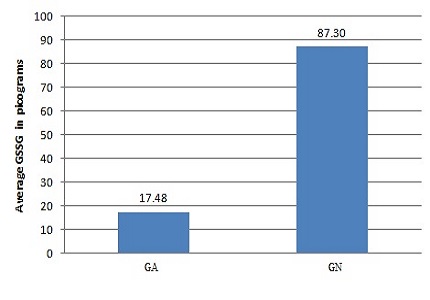Urine total glutathione levels as a potential marker of increased oxidative stress in autism
Abstract
Objective: Glutathione supplement has been prescribed as a therapy in autism often without proper glutathione quantification in the body. Though, increased speech and increased imaginary play is reported, increased screaming and loosening of stools have been reported as side effects. In this scenario, for an effective management of glutathione administration, we suggest a simple and reliable means of glutathione quantification before its administration. This study pertains to the quantification of total glutathione in autistic children using noninvasively taken urine as sample.
Materials & Methods: Urine samples were collected from ten autistic and nine neurotypical children of similar age and sex. Total glutathione was quantified using enzymatic recycling method.
Results: Mean levels of total glutathione in autistic children were significantly lower than the neurotypical children (p-value <0.001).
Conclusion: We conclude that total glutathione is lower in autistic children and noninvasively collected urine can be used for glutathione quantification before administering glutathione as a therapeutic measure.
Downloads
References
2. Theoharides TC, Kempuraj D, Redwood L. Autism: an emerging 'neuroimmune disorder' in search of therapy. Expert Opin Pharmacother. 2009 Sep;10(13):2127-43. doi: 10.1517/14656560903107789. [PubMed]
3. James SJ, Cutler P, Melnyk S, Jernigan S, Janak L, Gaylor DW, Neubrander JA. Metabolic biomarkers of increased oxidative stress and impaired methylation capacity in children with autism. Am J Clin Nutr. 2004 Dec;80(6):1611-7.
4. Chauhan A, Chauhan V. Oxidative stress in autism. Pathophysiology. 2006 Aug;13(3):171-81. Epub 2006 Jun 12. [PubMed]
5. Betteridge DJ. What is oxidative stress? Metabolism. 2000 Feb;49(2 Suppl 1):3-8. [PubMed]
6. Anna P M. Maria C F Alessandra P Mario L B. Gluatathione transferases and neurodegenerative diseases. Neurochemistry International. 2015 March; 82: 10-18. DOI:10.1016/j.neuint.2015.01.008.
7. Nosratola D V. Xiu Q. Fariba O. Behdad R. Induction of Oxidative Stress by Glutathione Depletion Causes Severe Hypertension in Normal Rats. Hypertension. 2000 Feb; 36:142-146. DOI:10.1161/01.
8. Van Naarden Braun K, Christensen D, Doernberg N, Schieve L, Rice C, Wiggins L, Schendel D, Yeargin-Allsopp M. Trends in the prevalence of autism spectrum disorder, cerebral palsy, hearing loss, intellectual disability, and vision impairment, metropolitan atlanta, 1991-2010. PLoS One. 2015 Apr 29;10(4):e0124120. doi: 10.1371/journal.pone.0124120. eCollection 2015.
9. James SJ, Rose S, Melnyk S, Jernigan S, Blossom S, Pavliv O, Gaylor DW. Cellular and mitochondrial glutathione redox imbalance in lymphoblastoid cells derived from children with autism. FASEB J. 2009 Aug;23(8):2374-83. doi: 10.1096/fj.08-128926. Epub 2009 Mar 23. [PubMed]
10. Onyango IG, Khan SM. Oxidative stress, mitochondrial dysfunction, and stress signaling in Alzheimer's disease. Curr Alzheimer Res. 2006 Sep;3(4):339-49. [PubMed]
11. Medina S, Martínez M, Hernanz A. Antioxidants inhibit the human cortical neuron apoptosis induced by hydrogen peroxide, tumor necrosis factor alpha, dopamine and beta-amyloid peptide 1-42. Free Radic Res. 2002 Nov;36(11):1179-84. [PubMed]
12. Julius M, Lang CA, Gleiberman L, Harburg E, DiFranceisco W, Schork A. Glutathione and morbidity in a community-based sample of elderly. J Clin Epidemiol. 1994 Sep;47(9):1021-6. [PubMed]
13. Mardinoglu A, Shoaie S, Bergentall M, Ghaffari P, Zhang C, Larsson E, Bäckhed F, Nielsen J. The gut microbiota modulates host amino acid and glutathione metabolism in mice. Mol Syst Biol. 2015 Oct 16;11(10):834. doi: 10.15252/msb.20156487. [PubMed]
14. Huttenhower C. Gevers D. Knight R. Abubucker S. Badger JH. Chinwalla AT. Creasy HH. Earl AM. FitzGerald MG. Fulton RS. Gigilo MG. Hallsworth-Pepin K. Lobos EA. Madupu R. Margrini V. martin JC. Mitreva M. Muzny DM. Sodergren EJ. Versalovic J. Structure, function and diversity of the healthy human microbiome. Nature. 2012 June; 486:207-214. DOI:10.1038/nature11234.
15. Valicenti-McDermott M. McVicar K. Rapin I. Wershil BK. Cohen H. Shinnar S. Frequency of gastrointestinal symptoms in children with autistic spectrum disorders and association with family history of autoimmune disease. J Dev Behav Pediatr. 2006 April; 27(Suppl):s128-36.
16. Horvath K, Perman JA. Autistic disorder and gastrointestinal disease. Curr Opin Pediatr. 2002 Oct;14(5):583-7. [PubMed]
17. Taylor b. Miller E. Lingam R. Andrews N. Simmons A. Stowe J. Measles, mumps, and rubella vaccination and bowel problems or developmental regression in children with autism: population study. BMJ. 2002 February; 16; 324(7334):393-6. [PubMed]
18. McElhanon BO, McCracken C, Karpen S, Sharp WG. Gastrointestinal symptoms in autism spectrum disorder: a meta-analysis. Pediatrics. 2014 May;133(5):872-83. doi: 10.1542/peds.2013-3995. [PubMed]
19. MacFabe DF. Short-chain fatty acid fermentation products of the gut microbiome: implications in autism spectrum disorders. Microbial Ecology in Health & Disease, 2012; 23:19260. DOI: 10.3402.mehd.v23i0.19260.
20. Malenka R C., Nestler E J. Hyman S E. “Chapters 10 and 13”, In Sydor A, Brown R Y. Molecular Neuropharmacology: A Foundation for Clinical Neuroscience (2nd ed). New York: McGraw- Hill Medical.pp.266, 318-323. ISBN 0-07-148127-3. [PubMed]
21. Kern JK, Geier DA, Adams JB, Garver CR, Audhya T, Geier MR. A clinical trial of glutathione supplementation in autism spectrum disorders. Med Sci Monit. 2011 Dec;17(12):CR677-82. [PubMed]

Copyright (c) 2016 Author (s). Published by Siddharth Health Research and Social Welfare Society

This work is licensed under a Creative Commons Attribution 4.0 International License.


 OAI - Open Archives Initiative
OAI - Open Archives Initiative


